Overview
complete
NHS Health Check Programme Introducing the Dementia Component
Increasing Awareness & Signposting
E-learning resource for practitioners
This e-learning package will take approximately 30 minutes to complete and must be completed in one session.
The training consists of the following 5 modules, please click introduction to begin.
This e-learning was last updated in January 2022, it will be regularly reviewed by a small working group and revised as required.
Why is dementia a priority?
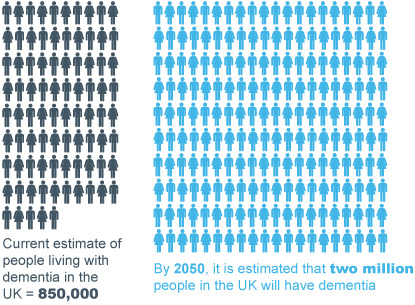
Professor Alistair Burns, National Clinical Director for Dementia
What: Everyone from age 40+ who has an NHS Health Check should be made aware that the risk factors for cardiovascular disease are the same as those for dementia i.e. ‘what’s good for the heart is good for the brain’. The programme provides dementia risk awareness for all attendees, and includes discussion on symptoms of dementia and, where appropriate, signposting to local memory services for 65 - 74 year olds.
Why: The inclusion of dementia risk reduction within the NHS Health Check programme is a wider part of the Prime Minister's challenge on dementia.
How: Raising awareness of dementia risk reduction in the NHS Health Check will require practitioners to give attendees information about dementia, risk factors, risk reduction and information about local available services.
Up to 40% of dementia is preventable through the same modifiable risk factors as for cardiovascular disease. These include; physical inactivity, healthy diet, reduced alcohol intake and not smoking. Other associated risk factors include hearing impairment, and exposure to air pollution.
Hover over or click for more info

Diet is important for health. Eating a diet with less saturated fat, added sugars and salts may help reduce the risk of dementia, as well as reduce the risk of cardiovascular disease.

Smoking has an extremely harmful effect on the heart, lungs and vascular system including the blood vessels in the brain. This increase the risk of developing dementia - smokers are almost twice as likely to develop dementia as non-smokers

A lack of regular physical activity along with a sedentry lifestyle can increase the risk of developing dementia, which is caused in part by problems with the circulation of blood to and around the brain.
Additional Information
- Check Best Practice Guidance
This guidance is updated annually.
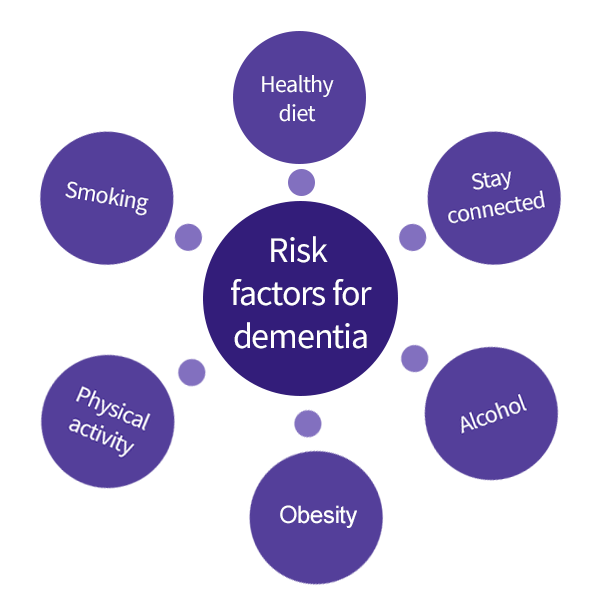

Keeping mentally active by learning new skills or joining clubs can also be a good way to connect with other people and improve mental wellbeing. You could play Scrabble, cards or bingo, do puzzles, help your grandchildren with their homework, join a quiz or darts team.

Regularly drinking above recommended levels increase the risk of developing dementia. Drinking high levels over time can directly cause a related condition called alcohol related brain damage

Obesity in mid life is a risk factor for dementia, diabetes, heart disease, some cancers and other health problems. It is therefore important to acheive and mantain a healthy bodyweight
Everyone who has an NHS Health Check should be made aware that the risk factors for cardiovascular disease are the same as those for dementia.
The key message that should be communicated is that ‘what's good for your heart is good for your brain’ and by adopting a healthier lifestyle people can reduce their risk of developing both cardiovascular disease and dementia.
Everyone will be given further information on reducing the risk of dementia via the leaflet. It is important to explain that discussing information about dementia is provided as a key part of the NHS Health Check programme for everyone from aged 40+.

A leaflet about dementia and cardiovascular disease will be given to attendees as part of their NHS Health Check appointment.
The leaflet will act as a prompt sheet for you to communicate the key messages and information about dementia.
This should take no longer than two minutes of the appointment.
In order to increase people’s awareness of dementia, there are some key bits of information that you will find useful.
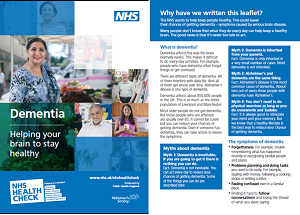
Here are some examples of websites and apps that may also be useful:
Use the information about dementia as an opportunity to promote positive behaviour change to lifestyle.
The 4 key messages to be communicated are:
- What’s good for your heart is good for your brain
- Factors that increase risk of cardiovascular disease also increase the chances of developing dementia
- Adopting a healthy lifestyle can reduce risk of both dementia and cardiovascular disease
- There are local services available for information and support
- Make sure you have enough time to talk about dementia risk reduction.
- Keep information clear and concise.
- Ensure that the attendee knows what dementia is.
- Advise attendees that the leaflet is theirs to take home.
- Allow the attendees to ask questions to alleviate their concerns.
- Here are some examples of websites and apps that may also be useful:
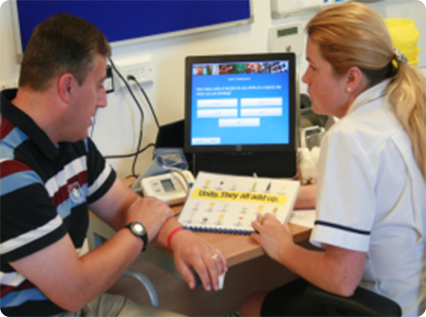
- Reinforce how people can take action to reduce risk of dementia
- Stay calm and don’t panic
- Listen to any concerns or worries
- Advise people that the Alzheimer’s Society provides a huge amount of online resources if people want to find out more, as does Alzheimer's Reasearch UK
- To access resources to support the conversation - Alzheimer's Research UK, Alzheimer's Society, NHS Health Check, Age UK

Q. What about genetics? My mother had dementia so does that mean I will get it?
A. Many people are concerned that if they have family members with dementia they are more likely to develop dementia themselves. Genetic factors only directly cause the disease in a very small number of families with dementia, the majority of cases of dementia are not caused by inherited genetics. There is no single gene responsible for all cases of dementia. The evidence shows that the risk factors which we have discussed in your NHS Health Check appointment are more likely to cause dementia.
Q. Are you giving me this information because you think I’ve got dementia?
A. All NHS Health Check attendees are been given this information as part as their NHS Health Check because the risk factors that increase the chance of heart disease, stroke, diabetes and kidney disease, also increase the chances of developing dementia.
Q. I thought I would be screened for dementia, are you going to do a memory test?
A. The dementia component of the NHS Health Check is designed to increase your knowledge and understanding of dementia, not to diagnose whether you have dementia or not. By better understanding the risk factors that increase your chances of developing dementia you can to take action to change them and reduce your risk of developing dementia and CVD. If you are concerned that you may have some of the symptoms of dementia then you should see your GP who can refer you for further assessment.
Q. I have some of the symptoms but they’re just due to ageing aren’t they?
A. Some of the signs and symptoms of dementia are the same as those which happen as part of normal ageing, for example briefly forgetting someone’s name. However, if you are concerned that you may have some of the signs and symptoms of dementia then you should speak to your GP.
Q. Alzheimer’s and dementia are the same thing?
A. Alzheimer’s disease is the most common cause of dementia. About two out of every three people with dementia have Alzheimer’s.
Q. You don’t need to do physical activity as long as you do crosswords and Sudoku?
A. It is always good to stimulate your mind and your memory. But we know that a healthy lifestyle is the best way to reduce your chance of getting dementia..
Q. What chance do I have of getting dementia?
A. One in 14 people over the age of 65 have dementia, and the condition affects 1 in 6 people over 80. However, it is difficult to accurately judge any one person’s chances of getting dementia because of the many risk factors involved. Those people who take regular physical exercise, get their risk factors treated and assessed regularly (e.g. cholesterol and blood pressure), drink only in moderation, adopt a healthy balanced diet and who don’t smoke are less at risk of developing dementia.
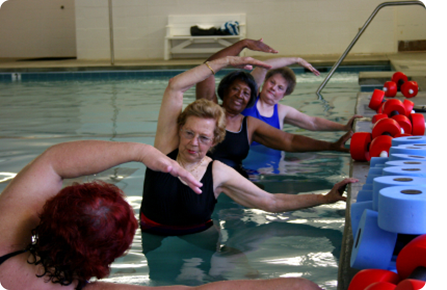
Use the forward and back arrows to navigation through the resource.
Sections must be completed in order.
To return to the home page click on the home button.
Completed sections will have a tick against them so you can track your progress
✓Sections will appear faded out until the previous section has been completed
If you are having trouble viewing the videos you may need to update or install flash on your browser. You can not advance the slide until the video has finished playing.